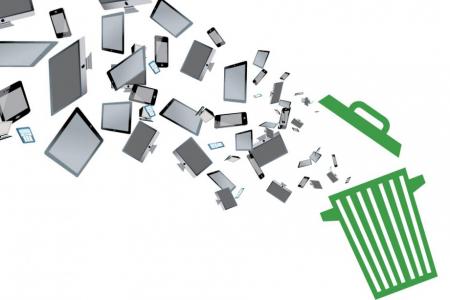Awareness key to improving e-waste recycling rates
Only a fraction of Singapore's 60,000 tonnes of electronic waste a year gets recycled; issue could lie with SMEs and consumers
With 60,000 tonnes of electronic waste - as heavy as 220 Airbus A380 planes - churned out every year, Singapore was recently named the second biggest e-waste producer in South-east Asia and the Far East by a United Nations University report.
Singapore generated 19.95kg of e-waste per capita in 2015, behind Hong Kong's 21.7kg and ahead of Taiwan's 19.13kg.
Yet only a small fraction of our discarded electronics and electrical equipment (EEE) gets recycled.
The problem could lie with consumers and small and medium enterprises (SME), recycling firms told The New Paper.
Vans Chemistry's managing director, Mr Venkatesha Murthy, said: "I would say 90 per cent of the corporates here do it the right way. The worrying thing is that we don't know the journey of the e-waste from SMEs and households.
"The computer or the TV that is left near the rubbish chute may be picked up by someone for reuse or repair. We don't know what happens after the most useful parts are extracted."
Often, they end up in the incineration plants, he said.
The lack of e-waste recycling is a pressing issue because it is both a waste of resources and a source of pollution when the incinerated bits are dumped in landfills.
Cadmium in rechargeable nickel-cadmium batteries, for instance, can accumulate in the body upon exposure and cause lung and kidney damage in the long term.
In Singapore, e-waste disposal is not legislated.
The National Environment Agency is looking at a national e-waste management system, with the study expected to be completed in the first quarter of this year.
Meanwhile, the public is encouraged to recycle e-waste through initiatives in the community.
One of the more extensive programmes is Renew (REcycling the Nation's Electronic Waste), which StarHub runs with partners DHL and recycling firm TES-AMM.
With specialised bins islandwide, the programme saw its e-waste recycling tonnage jump from 2,695kg in 2012 to nearly 53,000kg from January to November last year.
But awareness remains a key challenge, said StarHub.
Its spokesman told TNP: "To improve e-waste recycling rates, first, we need to understand what e-waste is, the impact and ramifications of its improper disposal as well as how and what we can do about it."
Legislation could help, said National University of Singapore's (NUS) Associate Professor Tong Yen Wah.
The co-director of NUS' Energy and Environmental Sustainability Solutions for Megacities programme cited Japan as an example.
With laws enacted in the 1990s, Japan boasts a 50 per cent recycling rate.
A regulatory system is needed to keep the e-waste problem from mounting, said Mr Venkatesha.
Then, the financial incentives can come in, he added.
Agreeing, e-waste recycler Virogreen's marketing manager, Mr Mohamed Sharul Annuar, said cost is a huge obstacle for SMEs, some of which are struggling to survive.
When such a system is in place and a market is created, recyclers will be incentivised to collect e-waste, Mr Venkatesha added.
StarHub believes in encouragement rather than enforcement.
"Being responsible is as simple as correctly disposing or recycling our e-waste, whether it be at an individual or at a corporate level," its spokesman said.
Get The New Paper on your phone with the free TNP app. Download from the Apple App Store or Google Play Store now



